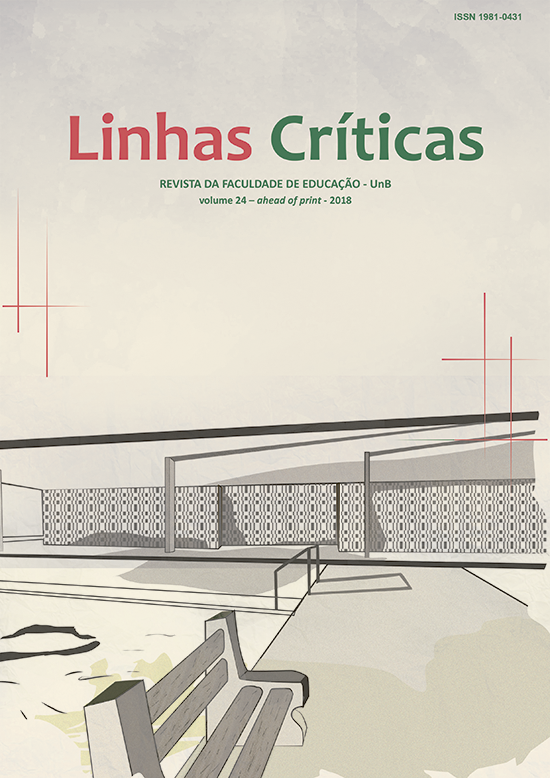Digital culture versus pedagogical authority
trends and challenges
DOI:
https://doi.org/10.26512/lc.v24i0.18993Keywords:
Digital culture, Pedagogical authority, EducationAbstract
The essay problematizes the crisis of pedagogical authority in times of digital culture.
Digital hyperlinks require reciprocal and interdependent recognition to assert
pedagogical authority as a condition of possibility for expression and technological
reeducation, creating forms of cooperative freedom in the reflexive and plural
authority of pedagogical sense. In this scenario, teachers need to understand and
incorporate the new digital languages into the re-education of information, creating
formative and cooperative links, to assert the authority and interrelations of
knowledge in digital culture. The paths covered indicate the need for reconstructive
actions to access technologies and to recreate knowledge, mobilizing a process of
interpretation about the disruptive impact of digital culture to recover pedagogical
authority, since without authority, a critical education is not built.
Downloads
References
ADORNO, Theodor Ludwig Wiesengrund. (2009). Dialética negativa. Rio de Janeiro: Jorge Zahar.
ADORNO, Theodor Ludwig Wiesengrund. (1995). Educação e Emancipação. Trad. Wolfgang Leo Maar. Rio de Janeiro: Paz e Terra.
ARAÚJO, Jussara de Loiola. (2005). Tecnologia na sala de aula: desafios do professor de matemática. Anais... III EEMOP. p. 1-10 Disponível em: http://www.mat.ufmg. br/~jussara/artigos/Araujo%20(2005).pdf. Acesso em: 26 mar. 2017.
BORBA, Marcelo de Carvalho; PENTEADO, Miriam Godoy. (2001). Informática e Educação Matemática. Belo Horizonte: Autêntica Editora.
DE MASI, Domenico. (2000). O Ócio Criativo. Entrevista a Maria Serena Palieri. 3. ed. Trad. Léa Manzi. Rio de Janeiro: Sexante.
FREIRE, Paulo. (2005). Pedagogia do oprimido. 36. ed. Rio de Janeiro: Paz e Terra.
GATTI, Luciano. (2009). Exercícios do Pensamento. Novos estud. CEBRAP. São Paulo, n. 85, p. 261-270. Disponível em: <http://www.scielo.br/scielo. php?script=sci_arttext&pid=S0101-33002009000300012> Acesso em: 26 jan. 2018.
HAN, Byung-Chul. (2017). Sociedade do cansaço. Trad. Ênio Paulo Giachini. 2. ed. Petrópolis, RJ: Vozes.
HORKHEIMER, Max. (1983). Autoridade e família. Lisboa: Apáginastantas.
LÉVY, Pierre. (1993). As Tecnologias da Inteligência: o futuro do pensamento na era da informática. Rio de Janeiro: Editora 34.
LIBÂNEO, José Carlos. (1994). Didática. São Paulo: Editora Cortez.
LIBÂNEO, José Carlos. (1986). Democratização da Escola Pública. A Pedagogia Histórico – Crítico Social dos Conteúdos. São Paulo: Loiola.
LIMA, Nádia Laguárdia de. (2006). Educação e Ciberespaço: O Conhecimento na Era Virtual. Pesquisas e Práticas psicossociais, 1(2), p. 11-25. Disponível em http://www.ufsj.edu.br/portal-repositorio/File/revistalapip/NadiaLaguardia.pdf Acesso em: 27 mar. 2017.
MORIN, Edgar. (2007). As duas globalizações: complexidade e comunicação, uma pedagogia do presente. 3. ed. Porto Alegre: Sulina, EDIPUCRS.
MRECH, Leny Magalhães. (2006). Sobrevivendo no inferno: o que é ser aluno na periferia hoje. Boletim da Escola Brasileira de Psicanálise, XII, p. 51 – 59.
PENTEADO, Mirian Godoy. (1999). Novos Atores, Novos Cenários: discutindo a inserção dos computadores na profissão docente. In: BICUDO, M. A. V. (Org.). Pesquisa em Educação Matemática: Concepções e Perspectivas. São Paulo: Editora UNESP, p. 297-313.
SAVIANI, Demerval. (2007). História das ideias pedagógicas no Brasil. Campinas: Autores Associados.
SCHWEPPENHAEUSER, Gerhard. (2003). Theodor W. Adorno zur Einfuehrung. Hamburg: Justus Verlag.
SIBILIA, Paula. (2016). O show do eu. 2. ed. Rio de Janeiro: Contraponto.
THEUNISSEN, Michael. (1983). Negativität bei Adorno. In: FRIEDEBURG, L. V.; HABERMAS, J. (Hrsg.). Adorno-Konferenz. Frankfurt/Main: Suhrkamp.
TÜRCKE, Christoph. (2010). Sociedade excitada: filosofia da sensação. Campinas: Editora da Unicamp.
ZUIN, Vânia Gomes; ZUIN, Antônio Álvaro Soares. (2011). Professores, tecnologias digitais e a distração concentrada. Educar em Revista, Curitiba, Brasil, n. 42, p. 213-228. Disponível em:< http://www.scielo.br/scielo.php?script=sci_arttext&pid =S0104-40602011000500014> Acesso em: 25 mar. 2017.
ZUIN, Antônio Álvaro Soares. (2015). A autoridade pedagógica em tempos de cultura digital. Educação e Filosofia, Uberlândia, v. 29, n. 58, p. 745 - 769. Disponível em: < http://www.seer.ufu.br/index.php/EducacaoFilosofia/article/ view/26187/18047> Acesso em: 25 mar. 2017.
Published
How to Cite
Issue
Section
License
Copyright (c) 2018 Revista Linhas Críticas

This work is licensed under a Creative Commons Attribution 4.0 International License.
Authors who publish in this journal agree to the following terms:
-Authors maintains the copyright and grants the journal the right of first publication, the work being simultaneously licensed under the Creative Commons Attribution License which allows the sharing of the work with recognition of the authorship of the work and initial publication in this journal.
- Authors are authorized to enter into additional contracts separately, for non-exclusive distribution of the version of the work published in this journal (eg publish in institutional repository or as a book chapter), with acknowledgment of authorship and initial publication in this journal.
-Authorers are allowed and encouraged to publish and distribute their work online (eg in institutional repositories or on their personal page) at any point before or during the editorial process, as this can generate productive changes as well as increase the impact and the citation of published work (See The Effect of Free Access).



